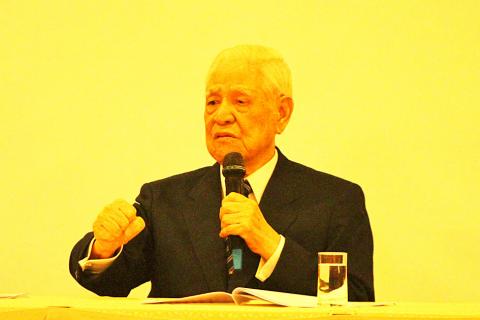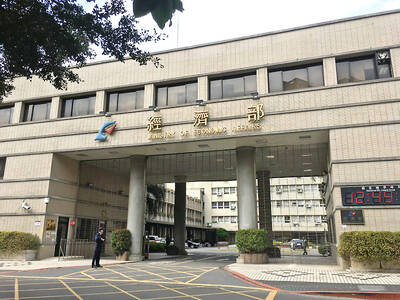To become a normal democracy, the nation has to build up its Taiwanese identity against Beijing’s threats from within and outside the nation, former president Lee Teng-hui (李登輝) said yesterday.
“The key to whether Taiwan can become a normal democracy and a leading international nation is based on whether improving the identity of ‘new Taiwanese’ succeeds,” Lee said at a convention of the Presbyterian Church in Tainan.
New Taiwanese are people who love the nation, prioritize its interests and support local democratic values, Lee said.

Photo: CNA
For the past five decades, China has been a constant threat to Taiwan, often seeking to infringe on or suppress Taiwanese sovereignty, Lee said.
Beijing is prepared to obstruct Taiwan’s democratization militarily, as it did during Lee’s term, when it launched a series of large-scale missile tests in the Taiwan Strait in the run-up to the 1996 presidential election, resulting in the Third Taiwan Strait Crisis, he said.
China has diversified its “united front” strategies by recruiting pro-unification supporters and sponsoring organized criminal activities in Taiwan to stir ethnic conflict and destabilize society, he said.
It also seeks to coerce Taiwan with economic manipulation, luring Taiwanese businesses from the nation to blunt the nation’s competitive edge, Lee said, adding that Taiwanese, while enjoying political freedom, are gradually losing economic autonomy to China.
“It is extremely irresponsible for any pro-Taiwanese leader not to take action against — or even to create — conflict between independence and unification groups,” Lee said.
“To overcome the challenge, the priority is to improve identification with Taiwan, where democracy is practiced. It is on such a basis that ethnic differences can be dissolved with democratization and anti-democracy politicians can no longer deceive the public with the fabricated ‘1992 consensus,’” he said.
The so-called “1992 consensus,” a term former Mainland Affairs Council chairman Su Chi (蘇起) in 2006 admitted making up in 2000, refers to a tacit understanding between the Chinese Nationalist Party (KMT) and the Chinese government that both sides of the Taiwan Strait acknowledge there is “one China,” with each side having its own interpretation of what “China” means.
The prosperity of a nation depends on a powerful leadership, a set of clearly defined goals and internal solidarity, Lee said.
The Democratic Progressive Party (DPP) for the first time won both the presidency and legislative majority in last year’s general elections, but its administration has been mired in growing public dissatisfaction, giving rise to the fear that a local administration might be replaced.
To prevent the “reinstatement of a Chinese administration,” such as the KMT regaining the government in 2008, the DPP government should ensure a properly functioning democracy and party system, prevent social division and proceed with reforms, Lee said.
He commended Premier William Lai (賴清德) for his insistence on Taiwanese independence, saying it is rare that a premier has the boldness to openly insist on independence.
Lai’s appointment has helped boost President Tsai Ing-wen’s (蔡英文) approval rating by 16 percentage points, and he is expected to lead economic development, Lee said.
He also called on Tsai to explain the DPP’s constitutional reform initiative to familiarize the public with the complicated issue, as DPP lawmakers have launched a proposal to amend the Constitution to pave the way for a pure presidential system.

LIMITS: While China increases military pressure on Taiwan and expands its use of cognitive warfare, it is unwilling to target tech supply chains, the report said US and Taiwan military officials have warned that the Chinese People’s Liberation Army (PLA) could implement a blockade within “a matter of hours” and need only “minimal conversion time” prior to an attack on Taiwan, a report released on Tuesday by the US Senate’s China Economic and Security Review Commission said. “While there is no indication that China is planning an imminent attack, the United States and its allies and partners can no longer assume that a Taiwan contingency is a distant possibility for which they would have ample time to prepare,” it said. The commission made the comments in its annual

DETERMINATION: Beijing’s actions toward Tokyo have drawn international attention, but would likely bolster regional coordination and defense networks, the report said Japanese Prime Minister Sanae Takaichi’s administration is likely to prioritize security reforms and deterrence in the face of recent “hybrid” threats from China, the National Security Bureau (NSB) said. The bureau made the assessment in a written report to the Legislative Yuan ahead of an oral report and questions-and-answers session at the legislature’s Foreign Affairs and National Defense Committee tomorrow. The key points of Japan’s security reforms would be to reinforce security cooperation with the US, including enhancing defense deployment in the first island chain, pushing forward the integrated command and operations of the Japan Self-Defense Forces and US Forces Japan, as

‘TROUBLEMAKER’: Most countries believe that it is China — rather than Taiwan — that is undermining regional peace and stability with its coercive tactics, the president said China should restrain itself and refrain from being a troublemaker that sabotages peace and stability in the Indo-Pacific region, President William Lai (賴清德) said yesterday. Lai made the remarks after China Coast Guard vessels sailed into disputed waters off the Senkaku Islands — known as the Diaoyutai Islands (釣魚台) in Taiwan — following a remark Japanese Prime Minister Sanae Takaichi made regarding Taiwan. Takaichi during a parliamentary session on Nov. 7 said that a “Taiwan contingency” involving a Chinese naval blockade could qualify as a “survival-threatening situation” for Japan, and trigger Tokyo’s deployment of its military for defense. Asked about the escalating tensions

The Ministry of Economic Affairs said it plans to revise the export control list for strategic high-tech products by adding 18 items under three categories — advanced 3D printing equipment, advanced semiconductor equipment and quantum computers — which would require local manufacturers to obtain licenses for their export. The ministry’s announcement yesterday came as the International Trade Administration issued a 60-day preview period for planned revisions to the Export Control List for Dual Use Items and Technology (軍商兩用貨品及技術出口管制清單) and the Common Military List (一般軍用貨品清單), which fall under regulations governing export destinations for strategic high-tech commodities and specific strategic high-tech commodities. The